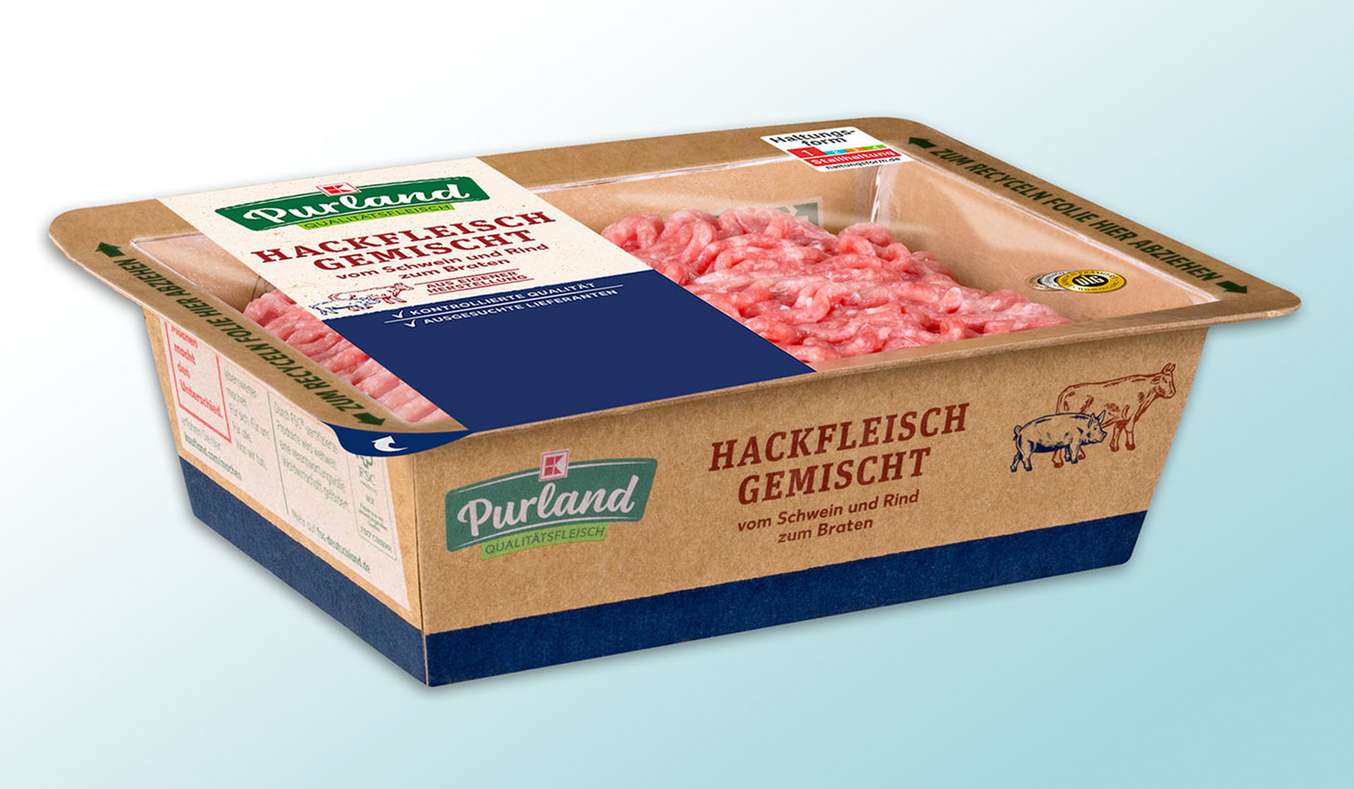Kaufland again focuses on plastic reduction

For three months now, Kaufland has been the first food retailer to offer its self-service minced meat in a sustainable, plastic-reduced packaging - initially in 30 branches in southern Germany. In order to further meet the goal of saving plastic, the grocer is now expanding the range and bringing sustainable packaging to all Kaufland branches in Bavaria and Baden-Württemberg.
"We don't want to miss any opportunity to reduce plastic waste," says Robert Pudelko, Head of CSR Purchasing Germany. "We are aware that the customer only has to get used to the new, sustainable packaging and therefore also turns to alternatives. Quality and price have not changed, so Kaufland relies on this innovation in the interests of environmental protection. In any case, we want to give customers an easy way to avoid plastic in their daily shopping. For this reason, we decided to offer the meat in plastic reduced packaging in even more branches. ”
About the packaging
Instead of a plastic bowl, a box is used for minced meat, which is only lined with a thin plastic film. By separating the cardboard and the film, the individual valuable materials in the packaging can be recycled separately. The customer can see from the information on the packaging how the components have to be separated in order to optimally recycle them. With the innovative packaging for minced meat, which uses 70 percent less plastic, Kaufland sets new standards in the field of meat from self-service.
In order to save plastic, Kaufland is constantly working with experts to develop new and optimize existing packaging. The new minced meat packaging is characterized by a significantly lower plastic content. Another advantage is that the carton is made from 100 percent of renewable resources that are FSC controlled and certified. In addition, Kaufland relies on recyclability for the plastic films used to line the box and for the lid.
Further optimizations
The topic of plastic avoidance is a very important concern for Kaufland. Until 2025, the company will reduce its own plastics consumption by at least 20 percent. The private labels are particularly in the focus of the company. "Kaufland recycles old material to make new money," says Pudelko. "We use the recovered PET granulate for the production of packaging material from private label products. For example, the bottle of the bevola herb bath is made of 100 percent recycled material. "The packaging of the K-Classic sunflower oil and the K-Bio ice tea are also made from recycled plastic. A "consciously packed" logo on the packaging informs about plastic reduction measures.
To the plastic strategy of the Schwarz Gruppe
The Schwarz Group, which, with the Lidl and Kaufland retail divisions, is one of the largest international retail companies, is aware of and takes responsibility for the environment. With REset Plastic, it has developed a holistic, international strategy that is divided into five fields of action: prevention, design, recycling, disposal, as well as innovation and education. This makes the vision of “less plastic - closed cycles” a reality.
The five guiding principles of the fields of action of REset Plastic - the plastic strategy of the Schwarz Group:
1. REduce - avoidance
We avoid plastic wherever possible and sustainably.
2. REdesign - design
We design products so that they are recyclable and close cycles.
3. REcycle - recycling
We collect, sort, recycle and close recycling cycles.
4. REmove - elimination
We support the removal of plastic waste from the environment.
5. REsearch - innovation and education
We invest in research and development for innovative solutions and provide information about recycling and resource conservation.

About Kaufland
Kaufland assumes responsibility for people, animals and the environment. The commitment to sustainability (CSR) is deeply rooted in the goals and processes at Kaufland. The initiative "Make the difference" reflects the attitude and identity of Kaufland. This is also reflected in the various CSR measures and activities. Kaufland calls for participation in the topics of home, nutrition, animal welfare, climate, nature, supply chain and employees, because only by participating can the world become a bit better.
Kaufland operates around 670 stores nationwide and employs approximately 74.000 employees. With an average of 30.000 products, the company offers a wide range of food and everything for your daily needs. The focus is on the fresh fruit and vegetables, dairy and meat, sausage, cheese and fish sections.
The company is part of the Schwarz Group, which is one of the leading companies in the food retail sector in Germany. Kaufland is located in Neckarsulm, Baden-Württemberg. More information about Kaufland at www.kaufland.de
